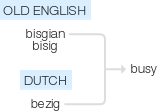Busy
Old English bisgian (verb), bisig (noun); related to Dutch bezig, of unknown origin.
wiktionary
From Middle English bisy, busie, from Old English bysiġ, bisiġ(“busy, occupied, diligent”), from Proto-West Germanic *bisīg(“diligent; zealous; busy”). Cognate with Saterland Frisian biesich(“active, diligent, hard-working, industrious”), Dutch bezig(“busy”), Low German besig(“busy”), Old Frisian bisgia(“to use”), Old English bisgian(“to occupy, employ, trouble, afflict”). The spelling with ⟨u⟩ represents the pronunciation of the West Midland and Southern dialects while the Modern English pronunciation with /ɪ/ is from the dialects of the East Midlands. [1]
etymonline
busy (adj.)
Old English bisig "careful, anxious," later "continually employed or occupied, in constant or energetic action" cognate with Old Dutch bezich, Low German besig, but having no known connection with any other Germanic or Indo-European language. Still pronounced as in Middle English, but for some unclear reason the spelling shifted to -u- in 15c.
The notion of "anxiousness" has drained from the word since Middle English. Often in a bad sense in early Modern English, "prying, meddlesome, active in that which does not concern one" (preserved in busybody). The word was a euphemism for "sexually active" in 17c. Of telephone lines, 1884. Of display work, "excessively detailed, visually cluttered," 1903.
busy (v.)
late Old English bisgian, "attend to, be concerned with, be diligent," from the source of busy (adj.). From late 14c. as "keep engaged, make or keep busy." Related: Busied; busying.
